Top 10+ Best Offshore Software Development Countries

As digital transformation continues to accelerate, the best offshore software development countries now play a vital role in helping businesses scale efficiently across industries—from fintech to healthcare and e-commerce. Choosing the right offshore destination is not just about price—it’s about balancing cost, skill, communication, security, and cultural compatibility. This guide compiles current insights on the Best Offshore Software Development Countries, compares rates by region and role, and gives you a practical, low risk method to choose the right destination and partner.
Which Factors Drive Offshore Software Development Rates?
Offshore software development rates change by country because of six levers—talent supply and seniority, specialization, English and culture, time zone coordination, legal and data security, and the overall business environment. The real cost is not only the hourly price but also productivity, quality, and risk:
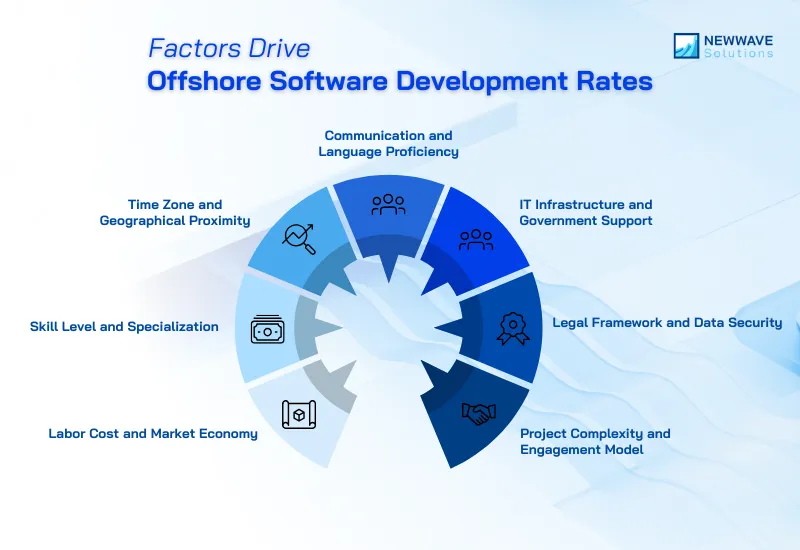
Labor Cost and Market Economy
The biggest determinant of offshore pricing is the local cost of living and average developer wages. Countries like Vietnam, India, and the Philippines offer lower hourly rates ($15–$30/hour), while Eastern Europe and Latin America tend to fall in the mid-range ($30–$60/hour). Premium hubs such as Singapore or Israel can exceed $100/hour due to their high living costs and advanced economies.
Skill Level and Specialization
Countries with a strong focus on STEM education and specialized skills—like AI, blockchain, or cloud computing—often charge higher rates. For example, Poland, Romania, and Ukraine have become go-to destinations for complex enterprise projects, while India and Vietnam lead in full-cycle web and mobile app development.
Time Zone and Geographical Proximity
Time zone alignment affects how teams collaborate. Nearshore destinations like Mexico or Poland offer overlapping work hours, faster feedback, and real-time communication. Offshore hubs such as Vietnam or the Philippines require more asynchronous workflows but enable 24-hour productivity with “follow-the-sun” development cycles.
Communication and Language Proficiency
Smooth communication drives successful offshore partnerships. Countries like India, the Philippines, and Poland rank high in English proficiency, ensuring clear collaboration with Western clients. Vietnam and Malaysia have also improved rapidly, with bilingual project managers bridging global teams.
IT Infrastructure and Government Support
Modern infrastructure and government backing create a stable outsourcing environment. Vietnam, Malaysia, and Romania have invested heavily in broadband, data centers, and tech parks. Vietnam’s National Innovation Centers, Malaysia’s MSC program, and Romania’s EU tech funding all foster global IT growth.
Legal Framework and Data Security
A strong legal system safeguards your data and IP. Poland and Romania comply with GDPR, while Vietnam and Singapore enforce strict local data protection laws. Ensure your partner signs NDAs, defines IP ownership, and follows ISO 27001 or SOC 2 standards.
Project Complexity and Engagement Model
Complex projects require higher expertise—and higher rates. Vietnam, India, and the Philippines excel in end-to-end development, while Poland and Ukraine lead in advanced areas like AI, fintech, and blockchain. Your cost also depends on the engagement model:
- Dedicated team: best for long-term scaling.
- Fixed-price: ideal for clear scope.
- Time & materials: flexible for agile work.
Top 15 Best Offshore Software Development Countries
Offshore development has become a global ecosystem, and these 15 countries stand out for their talent, cost-effectiveness, and reliability. Let’s explore what makes each country an ideal outsourcing destination for your business’s projects:
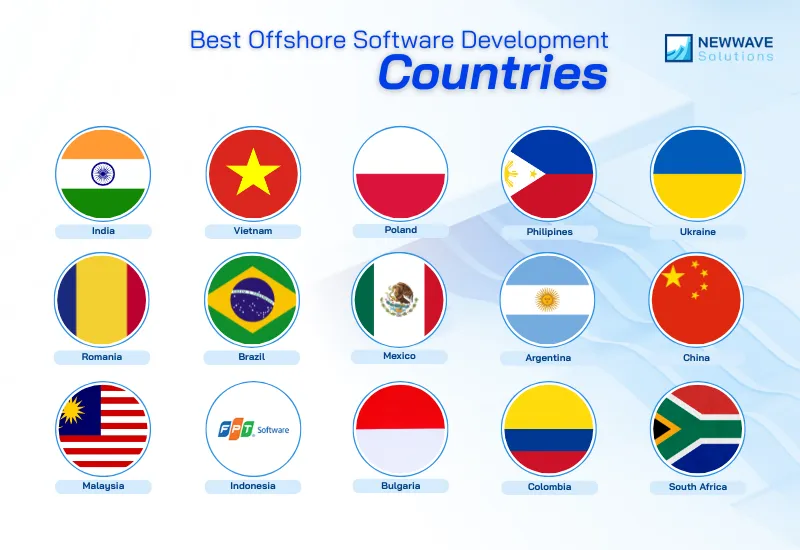
1. India
- Average developer hourly rate: 15–35 USD
- Popular programming languages: Java, Python, C++, .NET, JavaScript
- Language for communication: English widely used in business
- Top rated IT outsourcing companies: TCS, Infosys, Wipro, HCLTech, Tech Mahindra
When the topic of offshore software development is being considered, India offshore software development is on the list of the first countries to consider in mind. India offers the largest engineering pool and decades of delivery maturity across enterprise, cloud, data, and product engineering. Deep bench strength, flexible team scaling, and broad domain exposure make India the default starting point for many global firms.
Major cities such as Bangalore, Hyderabad, Pune, and Chennai are home to thousands of IT outsourcing companies, from startups to multinational giants. Combined with decades of experience serving global clients, India remains the first choice for businesses seeking cost efficiency without compromising quality.
| Pros | Cons |
|---|---|
| Largest IT talent pool globally (5M+ developers) | Time zone gap with Western clients |
| Excellent English proficiency | Quality inconsistency among smaller vendors |
| Cost-effective rates with scalable workforce | Communication delays in large teams |
| Strong infrastructure and enterprise experience | Increasing competition among outsourcing firms |
2. Vietnam
- Average developer hourly rate: $20–$35
- Popular programming languages: Python, Java, .NET, JavaScript
- Language for communication: English, Japanese
- Top-rated IT outsourcing companies: Newwave Solutions, FPT Software, KMS Technology, TMA Solutions
Vietnam is gradually becoming another software development destination offshore outsourcing market. It has turned into one of the fastest-growing markets and has hence emerged as a potential market for IT outsourcing services. With competitive pricing, young tech talent, and stable growth, it’s now considered one of the best countries for offshore software development.
Cities like Hanoi, Ho Chi Minh City, and Da Nang serve as global hubs for offshore software development, supported by a government committed to digital transformation. The combination of competitive pricing, strong technical capability, and political stability makes Vietnam ideal for long-term partnerships.
| Pros | Cons |
|---|---|
| Affordable rates with high development quality | Smaller workforce compared to India |
| Skilled young developers in web, mobile, and AI | Occasional language or cultural differences |
| Strong government support for IT sector | Limited availability of senior-level specialists |
| ISO-certified vendors and secure operations | Fewer large-scale outsourcing firms |
3. Poland
- Average developer hourly rate: $40–$55
- Popular programming languages: Java, JavaScript, Python
- Language for communication: English, Polish
- Top-rated IT outsourcing companies: Netguru, STX Next, Future Processing
Poland is one of the strongest offshore software development countries in Europe, known for its top-tier engineers and strict compliance with data security standards. The country’s EU membership ensures full GDPR compliance, making it an excellent choice for industries such as Fintech, Healthcare, and Banking.
Poland’s major tech hubs — Warsaw, Krakow, and Wroclaw — host more than 400,000 IT professionals. Developers are trained in advanced fields like AI, cybersecurity, and DevOps, while cultural proximity to Western Europe ensures smooth collaboration. English fluency and strong work ethics make Poland a preferred nearshore and offshore destination alike.
| Pros | Cons |
|---|---|
| EU-level security and GDPR compliance | Higher costs than Asian destinations |
| Highly educated engineers and strong technical skills | Smaller developer pool for rapid scaling |
| Excellent English communication | Increasing competition in local labor market |
| Convenient time zone for European clients | Slightly slower ramp-up for large projects |
4. The Philippines
- Average developer hourly rate: $20–$40
- Popular programming languages: PHP, JavaScript, C#, Python
- Language for communication: English
- Top-rated IT outsourcing companies: Accenture Philippines, Pointwest, Arcanys
The Philippines especially BPO (Business Process Outsourcing) is also slowly progressing towards the offshore software development industry. About 4 million Filipino professionals had prior working experience with international companies emphasizing the need of skilled professionals worldwide. The Philippines has 40,000 IT and engineering graduates every year proficient in Java, API development, .NET, and many others.
Tech hubs such as Manila, Cebu, and Davao are home to thousands of developers skilled in full-stack, web, and mobile development. The Philippines also excels in QA testing and software maintenance services, offering cost-efficient solutions for long-term partnerships.
| Pros | Cons |
|---|---|
| Best English proficiency in Asia | Smaller overall IT workforce |
| Strong customer service and cultural fit | Slower adoption of new tech (AI, blockchain) |
| Affordable pricing and reliable communication | Internet speed inconsistencies in some regions |
| Suitable for QA, testing, and support | Limited experience in enterprise-level systems |
5. Ukraine
- Average developer hourly rate: $30–$50
- Popular programming languages: JavaScript, C#, Python
- Language for communication: English, Ukrainian
- Top-rated IT outsourcing companies: Intellias, SoftServe, Sigma Software
Ukraine has established itself as one of the top software outsourcing destinations in Eastern Europe, delivering enterprise-grade solutions for global companies. Its 280,000+ IT specialists are known for exceptional problem-solving, technical depth, and innovation in AI, IoT, data science, and blockchain.
Kyiv, Lviv, and Kharkiv are home to world-class development centers working with clients in the U.S. and Europe. Despite political challenges, the IT industry remains resilient, supported by strong infrastructure and an internationally recognized talent base.
| Pros | Cons |
|---|---|
| Highly skilled engineers in AI, IoT, and blockchain | Geopolitical instability in certain regions |
| Excellent education and technical expertise | Occasional project delays due to local conditions |
| Strong European alignment and standards | Rising development costs compared to past years |
| Resilient infrastructure for global clients | Regional operational risks may require planning |
6. Romania
- Average developer hourly rate: $25–$45
- Popular programming languages: C++, Java, Python, JavaScript
- Language for communication: English, Romanian
- Top IT outsourcing companies: Endava, Tremend, Fortech
Romania combines technical excellence, affordability, and EU-level security, making it a strategic location for offshore software development. The country has over 200,000 developers, many of whom work with Western European and U.S. clients. Bucharest, Cluj-Napoca, and Iasi are key centers for software engineering, automation, and enterprise system development.
Romanian developers are recognized for their advanced math and engineering education. With high English proficiency and transparent business practices, Romania is a reliable destination for companies looking for Fintech development solutions or large-scale ERP systems.
| Pros | Cons |
|---|---|
| EU data protection and regulatory compliance | Bureaucracy can slow onboarding processes |
| Strong engineering and mathematics education | Slightly higher taxation than neighboring countries |
| Reliable communication and transparency | Limited availability of large development firms |
| Excellent value for complex enterprise projects | Slower government modernization pace |
7. Brazil
- Average developer hourly rate: $30–$50
- Popular programming languages: JavaScript, Python, Java
- Language for communication: Portuguese, English
- Top IT outsourcing companies: CI&T, Dextra Digital, BairesDev
Brazil is the largest IT hub in Latin America, known for its strong developer base, innovative culture, and overlapping time zone with the U.S. São Paulo, Rio de Janeiro, and Porto Alegre are technology centers that attract both startups and Fortune 500 companies.
Brazilian developers are known for their adaptability, creative problem-solving, and experience with cloud, AI, and mobile-first applications. With competitive rates and growing English proficiency, Brazil offers a nearshore advantage to North American clients.
| Pros | Cons |
|---|---|
| Convenient time zone for U.S. clients | Economic and political instability |
| Large, diverse IT talent base | Moderate English proficiency outside major cities |
| Advanced cloud and mobile expertise | Regional wage variations |
| Strong innovation and startup culture | Labor laws can increase project complexity |
8. Mexico
- Average developer hourly rate: $35–$55
- Popular programming languages: JavaScript, PHP, Python, C#
- Language for communication: English, Spanish
- Top IT outsourcing companies: Softtek, Wizeline, Kio Networks
Mexico is a top choice for nearshore software outsourcing services, offering seamless collaboration with North American companies due to geographic proximity and time zone alignment. Guadalajara, Mexico City, and Monterrey are key tech hubs hosting thousands of engineers specializing in web, mobile, and enterprise systems.
With robust universities and growing bilingual professionals, Mexico provides an ideal mix of quality, convenience, and cost savings. The government continues to support digital transformation and foreign investment through tax incentives and innovation programs.
| Pros | Cons |
|---|---|
| Geographic proximity to the U.S. | Slightly higher hourly rates than Asia |
| Real-time collaboration due to time zone overlap | Quality varies across regions |
| Bilingual professionals (English-Spanish) | Smaller talent pool compared to India |
| Mature IT infrastructure and government incentives | Occasional administrative complexity |
9. Argentina
- Average developer hourly rate: $25–$50
- Popular programming languages: JavaScript, C++, Java
- Language for communication: English, Spanish
- Top IT outsourcing companies: BairesDev, Globant, Belatrix
Argentina stands out in Latin America for its exceptional technical education and one of the highest English proficiency rates in the region. Buenos Aires and Córdoba are major IT centers specializing in AI, DevOps, mobile apps, and data engineering.
The country’s developers are known for their analytical mindset, adaptability, and experience working with global clients. Argentina’s time zone overlaps with the U.S., allowing real-time collaboration, while government programs encourage IT exports and digital training.
| Pros | Cons |
|---|---|
| Excellent English proficiency in Latin America | Economic instability and inflation |
| Strong technical education and creativity | Limited capacity for large-scale teams |
| Time zone overlap with North America | Currency fluctuation risks |
| Advanced skills in DevOps, AI, and app development | Smaller outsourcing market compared to Asia |
10. China
- Average developer hourly rate: $50–$80
- Popular programming languages: Java, Python, C#, Go
- Language for communication: Mandarin, English
- Top IT outsourcing companies: Huawei, Inspur, iSoftStone
China is a global technology superpower with world-leading expertise in AI, cloud, big data, and embedded systems. The country’s developers are highly skilled in both hardware and software integration, making it a top choice for industrial or enterprise-scale projects.
Beijing, Shenzhen, and Shanghai are innovation centers hosting thousands of tech companies. While English communication and IP laws have historically posed challenges, stricter regulations and global cooperation have improved transparency.
| Pros | Cons |
|---|---|
| Massive tech ecosystem and R&D capacity | Language and cultural barriers for Western clients |
| Expertise in AI, big data, and IoT | Intellectual property protection concerns |
| Strong government support and innovation | Complex legal and regulatory environment |
| Scalable workforce for large projects | Limited transparency among smaller firms |
11. Malaysia
- Average developer hourly rate: $25–$40
- Popular programming languages: PHP, Java, Python
- Language for communication: English, Malay
- Top IT outsourcing companies: Fusionex, Silverlake Axis, Mesiniaga
Malaysia offers a well-balanced outsourcing environment with multilingual talent, strong infrastructure, and government-backed IT incentives. Kuala Lumpur and Penang are established technology hubs where developers specialize in software engineering, fintech, and digital solutions.
Malaysia’s workforce is fluent in English and has cultural compatibility with Western clients, making communication easy. The country’s affordable pricing and political stability attract companies seeking long-term collaboration in Asia.
| Pros | Cons |
|---|---|
| Multilingual and culturally aligned workforce | Smaller IT workforce compared to neighbors |
| Excellent English proficiency | Limited specialization in advanced emerging tech |
| Government-backed tech incentives | Moderate costs relative to Vietnam |
| Modern digital infrastructure | Smaller number of large outsourcing firms |
12. Indonesia
- Average developer hourly rate: $20–$35
- Popular programming languages: PHP, JavaScript, Python, Java
- Language for communication: English, Bahasa Indonesia
- Top IT outsourcing companies: GDP Labs, Suitmedia, Ice House
Indonesia’s booming digital economy has turned it into a rising hub for software development outsourcing. The country’s young and dynamic talent pool is skilled in full-stack web and mobile development, serving startups and global clients.
Jakarta, Bandung, and Yogyakarta are emerging tech cities with strong innovation ecosystems. Government initiatives such as “Making Indonesia 4.0” continue to boost investment in technology and education, driving a steady rise in IT exports.
| Pros | Cons |
|---|---|
| Affordable pricing and creative developers | Moderate English fluency |
| Growing startup and digital economy | Lack of senior-level engineering resources |
| Strong government push for IT education | Infrastructure still developing in rural areas |
| Rapidly expanding tech ecosystem | Limited experience with enterprise-scale projects |
13. Bulgaria
- Average developer hourly rate: $35–$50
- Popular programming languages: Java, C#, PHP
- Language for communication: English, Bulgarian
- Top IT outsourcing companies: Musala Soft, ScaleFocus, Accedia
Bulgaria is one of Europe’s best-value IT destinations, combining low operating costs with EU data protection standards. Sofia and Plovdiv host hundreds of software companies delivering high-quality solutions for fintech, logistics, and enterprise clients.
Bulgarian developers are highly educated and often multilingual, providing seamless collaboration with Western clients. The country’s EU membership ensures strict legal compliance, while competitive rates make it an excellent nearshore choice.
| Pros | Cons |
|---|---|
| EU-grade data protection and security | Smaller overall talent pool |
| High English proficiency and transparency | Rising developer wages year over year |
| Excellent education in computer science | Limited availability for massive scaling projects |
| Reliable communication and business ethics | Competition from other Eastern EU countries |
14. Colombia
- Average developer hourly rate: $25–$45
- Popular programming languages: Python, Java, PHP, C#
- Language for communication: English, Spanish
- Top IT outsourcing companies: PSL Corp, Ceiba Software, Endava Colombia
Colombia has rapidly evolved into one of Latin America’s most promising outsourcing hubs. Medellín, Bogotá, and Cali host thriving tech ecosystems that attract global partnerships.
The country’s government has prioritized IT education and digital infrastructure, fostering a new generation of developers. Colombia’s cultural similarity and time zone overlap with the U.S. make it particularly effective for agile, collaborative projects.
| Pros | Cons |
|---|---|
| Ideal time zone for North American clients | Security perception challenges in some regions |
| Skilled developers with growing innovation culture | Moderate English proficiency outside metros |
| Affordable rates and strong digital education | Limited specialization in niche technologies |
| Stable government support for IT growth | Infrastructure uneven across smaller cities |
15. South Africa
- Average developer hourly rate: $30–$45
- Popular programming languages: Java, Python, C#, PHP
- Language for communication: English
- Top IT outsourcing companies: Entelect, SovTech, DVT
South Africa is gaining attention as a new frontier for offshore outsourcing, offering a combination of high English proficiency, excellent infrastructure, and affordable rates. Cape Town and Johannesburg are home to innovative software companies and startup incubators.
South African developers are proficient in modern technologies and maintain strong alignment with Western business culture. The government’s digital programs continue to attract global investments, particularly in fintech, cloud, and enterprise software.
| Pros | Cons |
|---|---|
| Excellent English communication and work culture | Smaller IT workforce than Asian hubs |
| Strong infrastructure and business environment | Slightly higher labor costs than Southeast Asia |
| Overlapping time zones with Europe | Slower scaling for large projects |
| High-quality fintech and enterprise expertise | Limited developer availability in niche fields |
The best offshore software development countries offer a diverse range of skilled talent, competitive pricing, and reliable services to help businesses scale and innovate. If you are evaluating offshore software development companies in USA and/or you are looking for outsourcing destinations around the world, it is good to know more about each country specialty so that the right decision could be made.
Average Offshore Software Development Rates by Regions and Roles
The cost of offshore software development varies widely depending on the region, skill level, and project complexity. Understanding these differences is crucial for accurate budgeting and partner selection.
Rates are influenced by multiple factors, including:
- Labor market maturity: Countries with advanced IT ecosystems (e.g., Poland, Vietnam, India) tend to have more consistent pricing tiers.
- Economic conditions: Inflation, taxes, and currency fluctuations can affect long-term contracts.
- Talent availability: Regions with a higher supply of developers offer more competitive rates, while specialized talent (AI, blockchain, cybersecurity) commands a premium.
- Engagement model: Dedicated teams are typically billed at blended rates, whereas on-demand or project-based models vary by expertise and duration.
Choosing the right location requires balancing cost-efficiency with technical depth and communication convenience. For instance, while Asia remains the most affordable option, Eastern Europe offers stronger specialization and cultural proximity, and Latin America provides time zone compatibility for U.S. clients.
| Region | Junior Developer | Mid-Level Developer | Senior Developer | Specialized (AI/Blockchain) |
|---|---|---|---|---|
| South Asia (India, Bangladesh) | $15–$25 | $25–$35 | $35–$50 | $50–$70 |
| Southeast Asia (Vietnam, Philippines) | $15–$25 | $25–$40 | $35–$50 | $50–$70 |
| Eastern Europe (Poland, Ukraine, Romania) | $30–$40 | $40–$55 | $55–$70 | $70–$100 |
| Latin America (Brazil, Mexico, Argentina) | $25–$35 | $35–$50 | $50–$65 | $65–$90 |
| Africa (South Africa) | $20–$30 | $30–$45 | $45–$60 | $60–$80 |
| Premium Hubs (Israel, Singapore) | $50–$80 | $80–$120 | $100–$150 | $120–$150+ |
For short Insights and Key Takeaways:
- Asia remains the most cost-effective region, offering reliable quality for routine development and scalable projects. Vietnam, India, and the Philippines provide an ideal mix of affordability and skill diversity.
- Eastern Europe leads in complex and regulated domains such as Fintech, AI, and Healthcare, where quality assurance and compliance are critical. The rates are higher but offset by stronger governance and project control.
- Latin America is ideal for North American clients needing real-time collaboration. While rates are mid-tier, time zone alignment and cultural familiarity often justify the investment.
- Africa and emerging markets like Kenya or Nigeria are entering the global outsourcing arena. Their competitive pricing and growing IT ecosystems make them promising alternatives for small to medium projects.
- Premium hubs (Israel, Singapore, Estonia) are suited for innovation-heavy or enterprise R&D projects that demand top-tier expertise and confidentiality. Though rates are high, delivery quality is exceptional.
- Role specialization drives pricing variance:
- Junior and mid-level roles handle implementation and UI/UX.
- Senior developers and architects lead integrations and scalability.
- Specialized engineers in AI, blockchain, DevOps, or data science command up to 2–3x higher rates due to their niche skills and limited availability globally.
Budgeting Tip:
To plan effectively, businesses should estimate:
- Simple app or MVP: $15,000–$40,000 (using junior/mid-level mix in Asia)
- Mid-size enterprise system: $50,000–$120,000 (senior teams in Asia or Eastern Europe)
- High-complexity solution (AI, blockchain, fintech): $120,000–$250,000+ (specialized teams in Eastern Europe or premium hubs)
When evaluating offers, always compare total cost of ownership (TCO) — including project management, QA, communication overhead, and post-launch maintenance — rather than just hourly rates.
How to Choose the Right Country for Your Offshore Development?
Here’s a step-by-step guide to simplify your decision-making process when selecting from the best offshore software development countries:
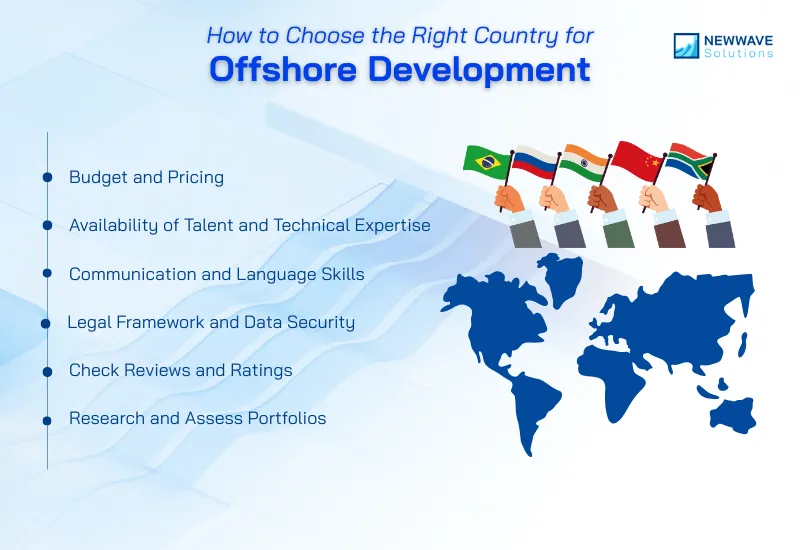
Budget and Pricing
Price is one known factor that causes outsourcing and to decide on the best among the best offshore software development countries, the cost rates of offshore software development must be compared. Prices range from $20-$70 per hour although some of the cheapest service providers come from India, Vietnam and the Philippines can be as cheap as $15-$40/hour.
On the other hand, countries from East Europe like Poland and Romania have quality developers that can be hired at a slightly higher price from $30-$60 per hour.
Tip: Please remember, often, signified by a low level of the rates, quality or essential components of the skills mentioned above could be missed.
Availability of Talent and Technical Expertise
Offshore team competence can affect your project in an extremely powerful manner, so great care should be taken when hiring. They have enormous human resources currently experienced with different languages like Python, Java, and JavaScript and from countries such as India and Vietnam.
Meanwhile, Poland and Ukraine specialize in highly technical and complex projects, making them ideal for AI, blockchain, and enterprise-level solutions.
Tip: Match the country’s expertise with your project requirements. For specialized skills like AI or blockchain, consider Eastern European countries. For broader, general development needs, India or Vietnam could be great options among the best offshore software development countries.
Communication and Language Skills
Communication plays a very crucial role for any project that needs to be done. Countries that spoke English such as the Philippines or Poland make it easy for clients from English speaking areas such as U.S or U.K.
Additionally, time zone alignment plays a significant role in communication, as countries like Argentina share similar time zones with the U.S., facilitating real-time collaboration.
Tip: Select one from the best offshore software development countries, fluent in your language but then operating in your time zone and share your cultural values. Also, ensure that the country comes out top or in the first order on the EF English Proficiency Index, which is a measure of a nation’s population’s fluency in English.
Legal Framework and Data Security
In any case, data security and protection of the intellectual property are the issues that have to be prioritized while choosing an offshore outsourcing nation. Poland among others has a good legal structure that can complement the EU data protection regulation and also Romania that boasts of a good legal structure that protects data security and intellectual property.
Similarly, Vietnam has made significant strides in strengthening its data protection laws, ensuring a secure environment for offshore development projects.
Tip: Always ensure that the offshore country, among the best offshore software development countries, has a legal infrastructure in place to protect proprietary data and that your outsourcing partner follows industry best practices for security and confidentiality.
Research and Assess Portfolios
When searching for an offshore software development team, it is crucial to go portfolio checking time. There are many countries such as Ukraine that have experienced and diversified profiles for managing such challenging projects like blockchain, artificial intelligence, cloud computing, and others. Evaluating previous projects completed by a company will provide you with information concerning that company’s technical strengths and suitability for your project.
Also, remember that you need to seek candidates with experience working in your industry as well. The people in the offshore teams sitting in Poland for example, or Argentina have probably worked with your businesses and have helped bring in the knowledge of the kind of solutions that your sector needs.
Tip: Hire a team from the best offshore software development countries, that are known for providing excellent services, and then, analyze their work to ensure that they cover a lot of ground relating to your particular industry.
Check Reviews and Ratings
Client feedback and ranking are by far some of the best ways through which one can assess an offshore software development team. Using the credibility of Clutch, GoodFirms, and LinkedIn, it is possible to get feedback regarding the company from clients who have already cooperated with it. When working with any of these platforms, charging more tends to serve as proof of the professionalism of the offshore team especially in countries such as Poland, India or Ukraine.
Reviews will also shed light on the company’s ability to deliver on time, communicate effectively, and resolve technical challenges. Checking reviews and ratings gives you a glimpse into the real experience of working with a particular team.
Tip: Use reviews to identify the strengths and weaknesses of potential offshore software development companies from the best offshore software development countries. Be sure to prioritize companies with a history of successful client outcomes.
FAQs
Which country is No. 1 in software development?
India is widely considered the number one country for software development. With over five million skilled engineers and thousands of established offshore software development companies, India dominates the global IT outsourcing market. Its developers are experienced across all major technologies, from web and mobile development to AI, cloud, and enterprise software systems.
Which country is the leader in offshore outsourcing?
Both India and Vietnam are recognized as global leaders in offshore outsourcing, each offering unique strengths. India is the volume leader; Vietnam is the fastest riser in value for money. Both countries benefit from strong government support, expanding ecosystems, and competitive pricing, but they play different roles.
Which abroad country is best for software engineers?
When it comes to choosing the best abroad countries for software engineers, Poland, Ukraine, and Vietnam consistently stand out for their technical depth, collaborative culture, and access to global projects. Each has developed a unique identity in the international software ecosystem, making them ideal destinations for both engineers and companies seeking strong offshore partnerships:
Poland
- High English proficiency. EU legal protections. Strong product culture.
- Senior architects, security, data engineering, and cloud native expertise.
- Regulated industries, fintech, and complex platforms where EU alignment matters.
- Higher rates than most of Asia, but high productivity and low coordination risk.
Ukraine
- Deep problem solving culture. Strong communities in AI, gaming, and systems programming.
- Excellent senior ICs and tech leads, fast prototyping, and strong code quality.
- Advanced backends, data heavy products, and performance sensitive services.
- Geopolitical risk requires business continuity planning and multi site strategies.
Vietnam
- Fast growing ecosystem. Modern stacks. Lots of greenfield work.
- Balanced teams that deliver features quickly with solid engineering discipline.
- Web and mobile apps, SaaS, cloud services, selective AI and blockchain.
- Senior and architect supply is smaller than Poland. Confirm English levels for client facing roles.
Conclusion
Selecting among the Best Offshore Software Development Countries is a strategic decision. Rates matter, but outcomes matter more. Map your required skills, communication pattern, and risk profile to a short list. Validate with a focused pilot, then scale with the partner and country that produce the best cost per outcome.
If your roadmap values strong engineering, predictable delivery, and smart budgets, consider offshore software development Vietnam. Newwave Solutions is a Hanoi based, ISO certified provider with more than three hundred engineers and a track record across SaaS, mobile, web, blockchain, AI, cloud, and data. We deliver flexible offshore software services through staff augmentation, dedicated squads, and full product teams. Our teams combine modern stacks with practical product thinking to ship real software development solutions that drive business outcomes. We can support specialized initiatives as offshore AI developers, modernize platforms, and accelerate domain programs such as Fintech development solutions.
When you are comparing offshore software development rates by country, Vietnam often offers the best blend of quality, speed, and value. Talk to us about your goals, risks, and deadlines. We will propose a lean pilot, assemble the right team, and prove the advantages of it outsourcing with clear metrics. Whether you need a reliable extension of your in house team or a full cycle build, Newwave Solutions stands ready among top offshore software development companies to deliver.
Ready to move from research to results? Let us help you plan an efficient engagement and start shipping.
To Quang Duy is the CEO of Newwave Solutions, a leading Vietnamese software company. He is recognized as a standout technology consultant. Connect with him on LinkedIn and Twitter.

Read More Guides
Get stories in your inbox twice a month.
Let’s Connect
Let us know what you need, and out professionals will collaborate with you to find a solution that enables growth.
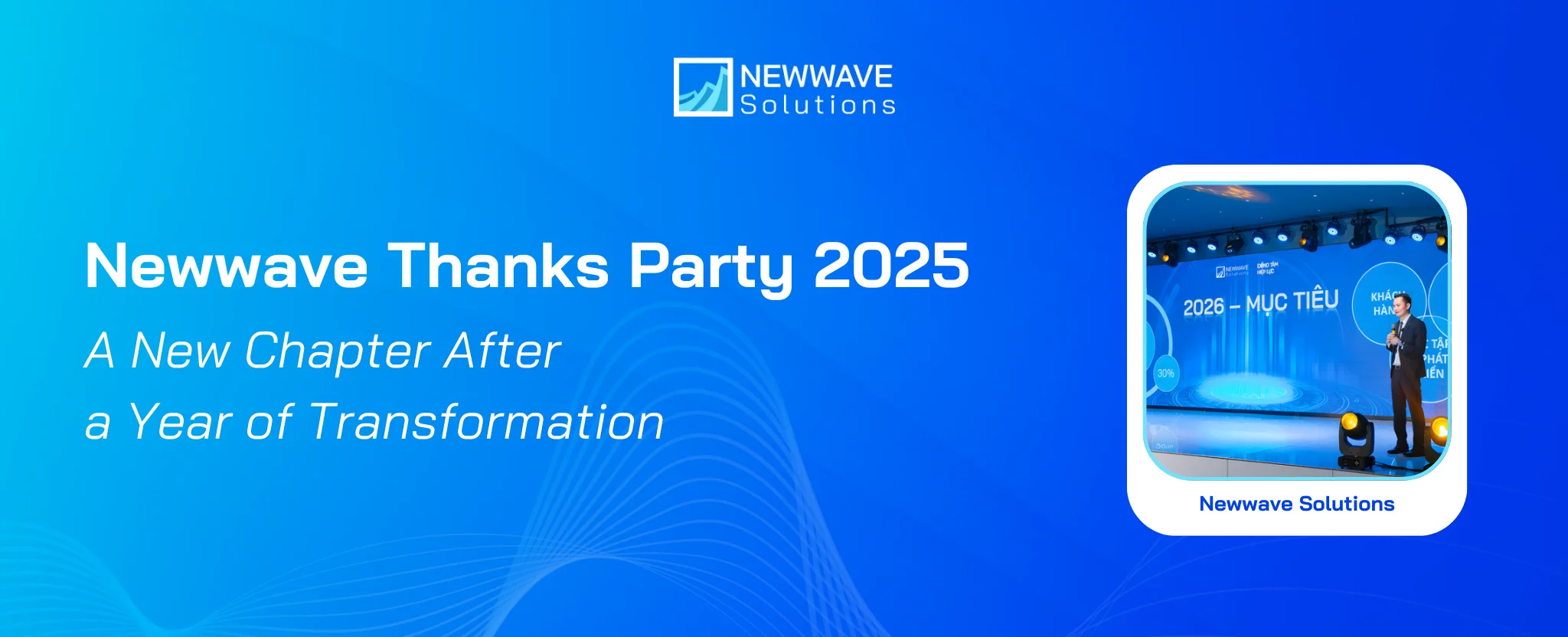

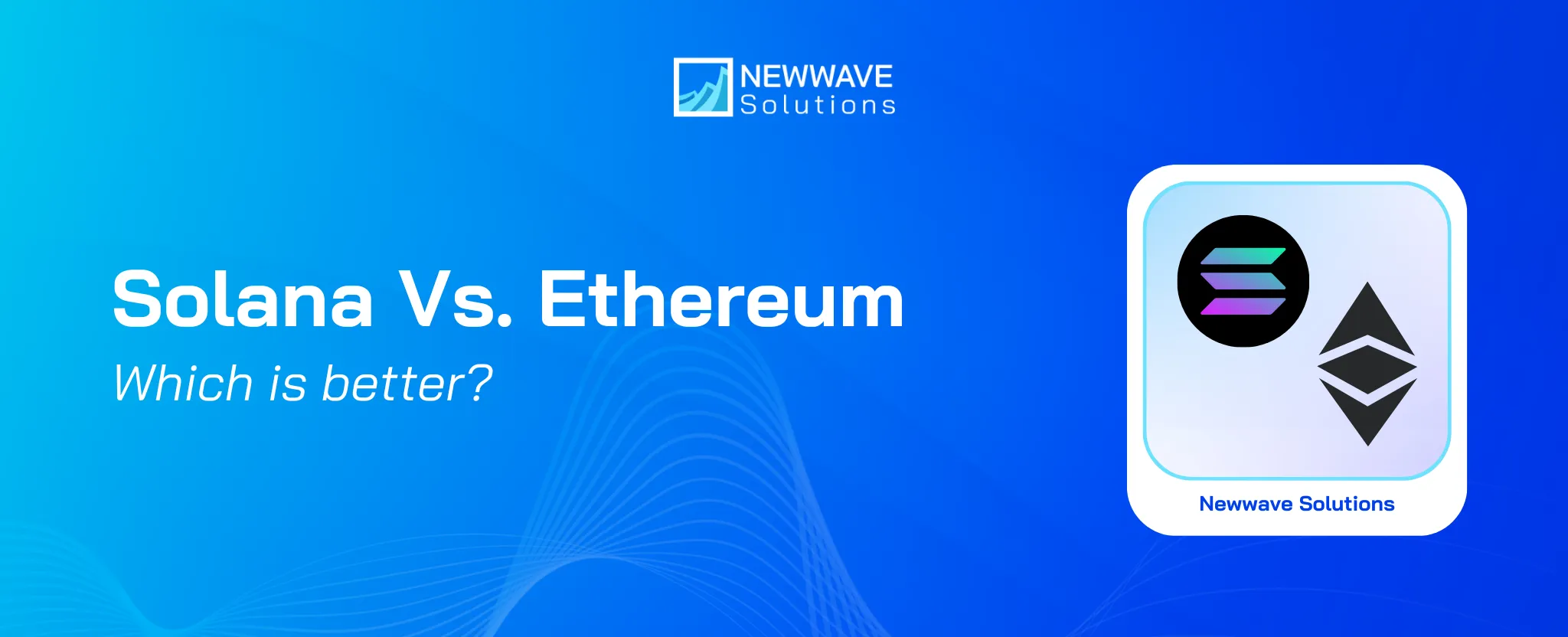

Leave a Reply